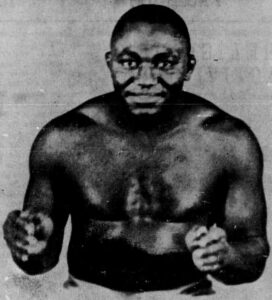Jack Claybourne’s Missouri Roots
Jack Claybourne, one of the earliest African-American, professional wrestlers, was born Elmer Claybourn at Mexico, Missouri, on March 8, 1910. In 1910, Mexico was home to about 5,939 residents.
Claybourne started his professional wrestling career in Missouri in 1931. Initially, Claybourne wrestled in nearby Moberly, Missouri. Moberly had a population of 13,722 residents compared to 8,290 residents in Mexico, Missouri in 1930.
Both Moberly and Mexico, Missouri are part of the Columbia, Missouri Metropolitan area. The close proximity to Mexico allowed Claybourn to stay home but start his professional career.
Promoters billed Claybourne from Kansas City, Kansas. It was not unusual for promoters to bill a wrestler from somewhere else particularly if they wanted the fans to think they were drawing wrestlers from outside the area.

Jack Claybourne, born Elmer Claybourn, in Mexico, Missouri during 1910
On Friday, April 15, 1932, Claybourne wrestled Jack Triene, also billed from Kansas City, in a two-out-of-three-falls match. Triene won the first fall but Claybourne took the next two. Claybourne won the second fall with an airplane spin, the first time a Moberly crowd ever witnessed the event.
“Wild Red” Berry, a future professional wrestling legend, won the first match on the card. Two weeks later on Friday, April 29, 1932, Claybourne and Berry wrestled in Moberly in the only two matches on the card.
In the main event, Claybourne wrestled George Koindaris of Kirksville, Missouri in the main event of the two match card. Claybourne won the first fall of a two-out-of-three-falls match with a body pin.
Koindaris used a flying headlock and body slam to defeat Claybourne for the second fall. Koindaris used the same combination during the third fall causing Claybourne to fall head first out of the ring.
Claybourne made it back into the ring but Koindaris pinned him easily for the third fall and match. Berry won two-out-of-three-falls in the opening match versus one of the many “Terrible Turks” to wrestle over the years.
Claybourne achieved the biggest accomplishment of his career, when Claybourne defeated the Ethiopian wrestler Hallie Samara for Samara’s World Championship reserved for Black wrestlers in Louisville, Kentucky on Tuesday, September 2, 1941 at the Allen Sports Arena.
Samara won the first fall in fifteen minutes, twenty-one seconds with a flying tackle. Claybourne evened up the match with a rolling headlock at twelve minutes, eight seconds of the second fall. Claybourne won the title at twenty-two minutes, thirty-eight seconds of the third fall with a body kick and slam.
The match with Samara was the third of a three match series in Louisville. Promoters recognized Claybourne as the Black World Heavyweight Champion at least as late as 1948.
During his career Claybourne wrestled Harold Sakata, Samara, the original Jules Strongbow (Los Angeles booker), Frank Jares, “Whipper” Billy Watson, Mike DiBiase, Szandor Szabo, and “Bulldog” Danny Plechas.
Claybourne main evented at the Olympic Auditorium in Los Angeles, California, where Claybourne settled with his family. On January 7, 1960, at forty-nine years of age, Claybourne tragically took his own life.
Claybourne struggled to get bookings and talked about committing suicide for seven months before he took his life. Claybourne drank heavily during this time making his depression worse. His drinking and depression caused him to argue with his wife Lillian causing Jack Claybourne to spiral down further.
On the afternoon of January 7th, Jack Claybourne called Lillian and told her that he just had an argument with their daughter over riding her bicycle. Realizing that Jack Claybourne was more upset than he should have been over a minor argument, Lillian asked a friend to accompany her to the Claybourne’s house.
Lillian and her friend found Claybourne laying on the bathroom floor in a pool of blood. Claybourne shot himself with his shotgun bringing a premature end to his storied life.
Sources: Moberly Monitor-Index and Moberly Evening Democrat (Moberly, Missouri), April 16, 1932, p. 5 and April 30, 1932, p. 5, The Courier-Journal (Louisville, Kentucky), September 3, 1941, p. 22 and California Eagle (Los Angeles, California), January 14, 1960, p. 1, 4
Pin It
